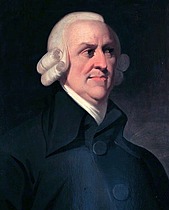
The Wealth of Nations
The Wealth of Nations is the first scientific argument for the principles of political economy, considered as the turning point for all subsequent economic thought. First published in 1776, Adam Smith’s masterpiece remains as the foundation of economic analysis, modern economic thought, and modern capitalism – widely influential for raising the standards of living today. This masterpiece tackles such broad topics as division of labor, productivity, free markets, and our individual need to fulfill self-interest that results in societal benefit, also known as the invisible hand. Many other authors were influenced by the book and used it as a starting point in their own work, including Jean-Baptiste Say, David Ricardo, Thomas Malthus and, later, Ludwig von Mises.
WEALTH OF NATIONS
BOOK ONE: Of the Causes of Improvement in the productive Powers of Labour, and of the Order according to which its Produce is naturally distributed among the different Ranks of the People
Chapter I - Of the Division of Labour
Chapter II - Of the Principle which gives Occasion to the Division of Labour
Chapter III- That the Division of Labour is limited by the Extent of the Market
Chapter IV - Of the Origin and Use of Money
Chapter V - Of the real and nominal Price of Commodities, or of their Price in Labour, and their Price in Money
Chapter VI - Of the component Parts of the Price of Commodities
Chapter VII - Of the natural and market Price of Commodities
Chapter VIII - Of the Wages of Labour
Chapter IX - Of the Profits of Stock
Chapter X - Of Wages and Profit in the different Employments of Labour and Stock
Chapter XI - Of the Rent of Land
BOOK TWO: Of the Nature, Accumulation, and Employment of Stock
Chapter I - Of the Division of Stock
Chapter II - Of Money considered as a particular Branch of the general Stock of the Society, or of the Experience of maintaining the National Capital
Chapter III- Of the Accumulation of Capital, or of productive and unproductive Labour
Chapter IV - Of Stock lent at Interest
Chapter V - Of the different Employment of Capitals
BOOK THREE: Of the different Progress of Opulence in different Nations
Chapter I - Of the Natural Progress of Opulence
Chapter II - Of the Discouragement of Agriculture in the ancient State of Europe after the Fall of the Roman Empire
Chapter III- Of the Rise and Progress of Cities and Towns, after the Fall of the Roman Empire
Chapter IV - How the Commerce of the Towns contributed to the Improvement of the Country
BOOK FOUR: Of Systems of political Economy
Chapter I - Of the Principle of the commercial, or mercantile System
Chapter II - Of Restraints upon the Importation from foreign Countries of such Goods as can be produced at Home
Chapter III- Of the extraordinary Restraints upon the Importation of Goods of almost all Kinds, from those Countries with which the Balance is supposed to be disadvantageous
Chapter IV - Of Drawbacks
Chapter V - Of Bounties
Chapter VI - Of Treaties of Commerce
Chapter VII - Of Colonies
Chapter VIII - Conclusion of the Mercantile System
Chapter IX - Of the Agricultural Systems, or of those Systems of Political OEconomy, which represent the Produce of Land, as either the sole or the principal Source of the Revenue and Wealth of every Country
BOOK FIVE: Of the Revenue of the Sovereign or Commonwealth
Chapter I - Of the Expences of the Sovereign or Commonwealth
Chapter II - Of the Sources of the general or public Revenue of the Society
Chapter III- Of public Debts

